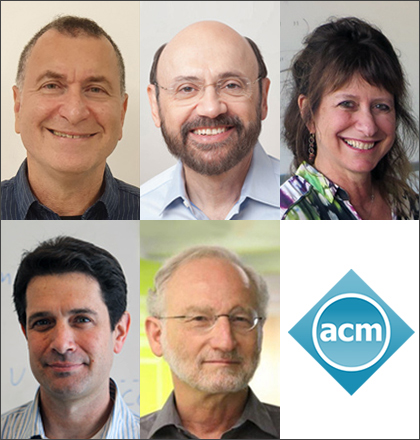
Professor Anna Karlin and a team of collaborators have received the ACM Paris Kanellakis Theory and Practice Award from the Association for Computing Machinery for their work on balanced allocations, also known as the “power of two choices.” Karlin, a member of the Allen School’s Theory of Computation group, first introduced the balanced allocations paradigm with co-authors Yossi Azar of Tel Aviv University, Andrei Broder of Google Research, and Eli Upfal of Brown University at the 1994 ACM Symposium on Theory of Computing (STOC) in what the ACM has described as “elegant theoretical results” that continue to have a demonstrable impact on the practice of computing.
The team’s paper considers a basic “balls-in-bins” problem: It has long been known that when n balls are tossed one at a time into n bins, independently and uniformly at random, the expected value of the maximum load is about log(n)/loglog(n). Karlin and her colleagues showed that balancing the allocation of the balls by first selecting not one, but two bins at random, and then placing the ball in the bin that has the lesser load between the two reduces the expected maximum load across all the bins to loglog(n) — an exponential improvement.
Fellow honoree Michael Mitzenmacher of Harvard University later significantly extended these initial results.
“Since bins and balls are the basic model for analyzing data structures, such as hashing or processes like load balancing of jobs in servers, it is not surprising that the power of two choices that requires only a local decision rather than global coordination has led to a wide range of practical applications,” the ACM observed in a press release. “These include i-Google’s web index, Akamai’s overlay routing network, and highly reliable distributed data storage systems used by Microsoft and Dropbox, which are all based on variants of the power of two choices paradigm.”
Karlin’s Allen School colleague, Paul Beame, recalls that it was “stunning and unexpected” that such a simple change in the algorithm would yield such a dramatic improvement — one that has proven to have an enduring impact within the field.
“One can easily ensure balanced allocations if one has prior knowledge about the pattern of requests or some form of centralized control but, without that, finding good balance becomes difficult. The typical solution before the work of Anna and her co-authors allocated each request based on a single random choice of a resource. However, unless the system is vastly over-provisioned, this will result in a somewhat bad overall imbalance,” explained Beame. “What Anna and the team showed is that a simple adjustment — making two random choices rather than just one, and keeping the better of the two — results in an exponential improvement in the overall balance, effectively at most a small constant for all reasonable data sizes.
“In the last couple of decades, their paper has led to much follow-on research,” Beame noted. “The ‘power of two choices’ has since become one of the essential new paradigms in the design of dynamic data structures and algorithms and is regularly taught in graduate courses worldwide.”
Prior to winning the ACM Paris Kanellakis Award, Karlin recently became the first Allen School faculty member to be elected to the National Academy of Sciences for career contributions to algorithms and algorithmic game theory. She is one of two Allen School faculty members to be recognized with ACM technical awards this week, as Shyam Gollakota received the ACM Grace Murray Hopper Award for his work on wireless sensing and communication.
Read the ACM announcement here, and learn more about the Paris Kanellakis Theory and Practice Award here.
Congratulations, Anna!

